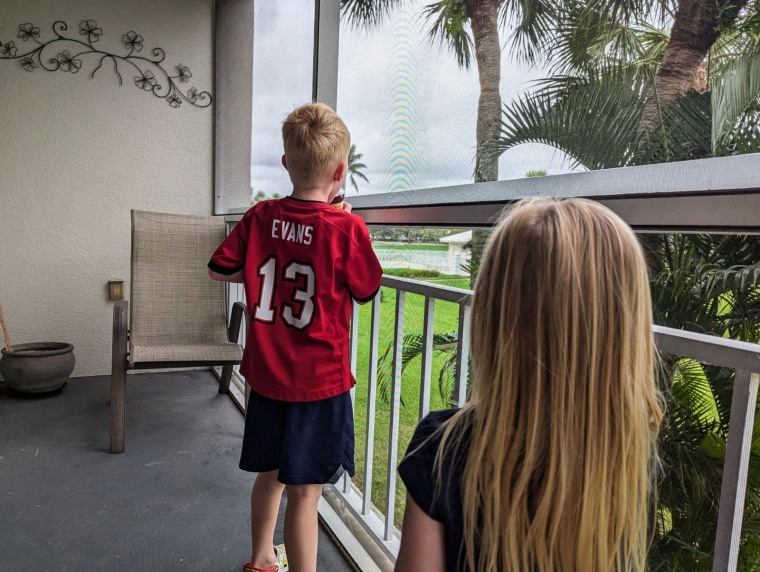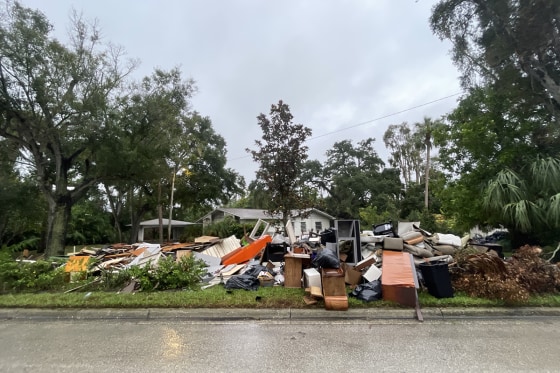We’re still assessing how much Hurricane Milton damaged homes and businesses. People in Florida are in shock at the emotional toll that coping with two powerful storms and an unusual number of tornadoes in a short period of time has taken.
At Johns Hopkins All Children’s Hospital in St. Petersburg, Dr. Meghan Martin practices pediatric emergency medicine. She said that within the last four years, her home had flooded three times, the first time being during Hurricane Idalia in late August 2023.

“Many people are experiencing anxiety and stress, which is exacerbated by the proximity of two distinct storms,” Martin stated.
Although the devastating floods in Milton did not destroy her home, she is unclear of what to do next.
“Yes, I definitely feel exhausted. Martin, who has been at the hospital during the storm collaborating with the emergency operation center, said, “I’m tired.” It goes without saying that we must make some adjustments since we cannot continue in this manner. That’s more than my mental health can manage.”
Because of a phenomena known as “common reactions to abnormal events,” stress, anxiety, depression, and other mental health issues frequently worsen after natural disasters, according to the Centers for Disease Control and Prevention.
Psychoanalyst Dr. Gail Saltz, an associate attending physician at NewYork-Presbyterian Hospital, stated, “These natural disasters are psychologically beyond the normal human experience, and this trauma often leads to ongoing mental health struggles.”
Following mandatory evacuation orders, 39-year-old Michelle Chernicoff of New Port Richey, Florida, escaped Hurricane Milton on Monday with her husband and two small children to her in-laws’ West Palm Beach home.

Her house was spared damage during Hurricane Helene, but less than five miles away, there was total destruction. She recounted, “I was just worried that the tree would come crashing down on my bed, so I didn’t go to bed until the storm had passed.”
Chernicoff said on Thursday that there were many trees fallen in her neighborhood following Milton’s devastation of the region, “but from our cameras, our house looks good.”
She remarked, “You have this dichotomy of being relieved that it’s not you and horrified that it’s someone you know, your next-door neighbor.”
Over a century has passed since the Sunshine State’s coastline was hit by more than 100 devastating storms. Constant storm exposure may be harmful to one’s mental health in addition to causing physical devastation.
After a tragedy, it’s normal to experience tension, anxiety, sadness, and concern; but, each person’s response is unique and subject to change over time. It can also be very difficult for kids.
Rita Simmons, 46, of Pinellas County, Florida’s west coast, was furiously getting ready “for the unknown,” at her house with her husband, their two kids, and her 77-year-old mother, before Milton stormed in on Wednesday night.
She admitted, “I cried in the middle of Publix,” explaining how guilty she felt for leaving her kids in the grocery store before the hurricane.
They were attempting to conceal their concern from the girls, but she was already managing increased anxiety following Helene’s floods and was distraught about the local beaches that had been devastated.
Simmons added, “We’re letting our 6-year-old set up a special area just for her with books, snacks, and flashlights because she’s scared.”
Her spouse has attempted to allay her family’s concerns; he is a native of Florida and has been through many significant storms.
“You really have to experience these firsthand to know how you will react and how they will affect your mental health,” the speaker stated.
Anxiety might worsen due to uncertainty, particularly in those with underlying mental health issues.
“Once we increase uncertainty into patients with underlying mental health challenges, then we start to see patients decompensate and end up in the emergency department with an acute mental health crisis,” stated Dr. Matt Shannon, director of community emergency medicine at University of Florida Health.
According to Shannon, he has seen an increase in patients with unstable anxiety in the last ten years of practice. These patients typically believe that their circumstances are beyond their control, and examples of such occurrences include stresses from their jobs and families or the likelihood of severe tropical weather.
According to NewYork-Presbyterian Saltz, persons first undergo a “acute stress reaction,” which might include:
- worried or depressed state of mind.
- avoiding anything that may trigger memories of the storm.
- issues with sleep.
- Intolerance or a persistent sense of unease.
- inability to focus or lack of enjoyment in anything.
- having invasive, unsettling recollections from the incident or its aftermath.
“These symptoms can linger for up to a month, but if untreated, some of the hurricane victims will develop post-traumatic stress disorder, which encompasses all of these symptoms continuously,” the spokesperson stated.
“The hurricanes have heightened our anxiety and fear,” observes Simmons, who has experienced many hurricanes and suffers from a number of medical conditions, including generalized anxiety disorder and obsessive-compulsive disorder.
“A sense of powerlessness”
Shannon is especially concerned about patients in remote rural locations who could come very unwell, having exhausted their regular resources due to their isolation from society.
Other susceptible groups, such as inpatient chemotherapy patients, were further stressed by Hurricane Helene.
Florida is where Dr. Michael Warren, 34, and his wife Kelly Warren, 33, were raised.
Hurricane Helene caused minor backyard and yard debris at their Sarasota house, but two feet of water flooded his parents’ Clearwater property.
Warren was given an acute leukemia diagnosis a few weeks ago, and he is presently receiving induction chemotherapy at the Moffitt Cancer Center in Tampa.
Being confined to a hospital “definitely gives you a sense of helplessness,” Michael stated.
His wife lost it when she learned about Hurricane Milton. Kelly remarked, “I just started crying because it’s just too much.”
ongoing sorrow and storm-related anxiety
It’s normal to feel overwhelmed just after a catastrophe, but doctors warn that chronic feelings of despondency, trouble focusing, or inability to think about anything else should raise red flags when they interfere with day-to-day activity. Individuals who have experienced trauma are more likely to misuse alcohol or other drugs.
In addition, Saltz states that “high irritability is a symptom, and anger and violence can follow if left untreated.”
Although children, elderly people, and first responders may be especially vulnerable to floods, evidence indicates that symptoms might last for years.
Mental health professionals advised anybody in need of support to call a disaster distress line and speak with a licensed counselor. Toll-free at 1-800-985-5990, the Substance Abuse and Mental Health Services Administration (SAMHSA) advises.






